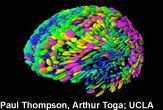Cola Wars Fought in the Brain

One soft drink advertisement commands, "Obey your thirst," but your taste buds may get trumped by the sway of brand names. All those commercials and jingles and celebrity endorsements get stored in the brain, apparently biasing preferences, new research shows.
The study probed the effect of these cultural influences by returning to the classic blind taste test between Coke and Pepsi.
These two products are nearly the same in contents, and yet many consumers have strong feelings about their favorite. Is this because one tastes better?
In a study of 67 volunteers, researchers at Baylor College of Medicine tried to isolate the sensory input of tasting from the effects of brand recognition. They found that subjects chose the two colas equally in blind taste tests.
But when told that one of the cups they were drinking was Coke, these same subjects picked that cup about 75 percent of the time. This preference for a brand name occurred even though both cups in this round of testing actually contained Coke.
Interestingly, the same was not true in the parallel experiment when one cup was labeled as Pepsi, but both cups were filled with Pepsi. In this case, the subjects chose the labeled cup as often as the unlabeled one.
To explore how brand recognition operated in the brain, the scientists scanned the subjects with functional magnetic resonance imaging (fMRI), which tracks blood flow. While sipping colas, a certain area of the subjects' brains showed increased activity - apparently because it was the taste reward center.
Sign up for the Live Science daily newsletter now
Get the world’s most fascinating discoveries delivered straight to your inbox.
During a blind test, people generally picked the soda that caused more activity in this region of their brain.
But when a Coke picture flashed in front of the subjects prior to drinking, other parts of the brain - some dealing with memory - lit up. The researchers could not detect similar activity when a Pepsi picture was flashed.
The implication is that the reference to Coke elicited memories that biased the choice of some of the subjects, but the same recollections did not arise from a Pepsi cue - at least not in a way sufficient to override the direct taste sensation.
The study, which was financed by the National Institute on Drug Abuse and the Kane Family Foundation, was published in the Oct. 14 issue of the journal Neuron.










